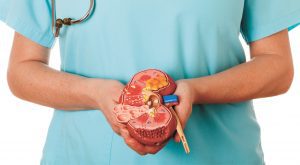By Ingrid Calliste, MD
 The kidneys are a major part of our detoxifying system. These two small bean-shaped organs clean the blood and filter waste and toxins to make urine. If there is an imbalance or insufficient fluids, the waste can build up in the kidneys and cause kidney stones.
The kidneys are a major part of our detoxifying system. These two small bean-shaped organs clean the blood and filter waste and toxins to make urine. If there is an imbalance or insufficient fluids, the waste can build up in the kidneys and cause kidney stones.
Many people are unaware that they’ve ever had kidney stones because they can easily move through the urinary tract and are passed out with little to no discomfort if they are small enough. However, larger kidney stones do cause irritation, and in severe cases, can be extremely painful. Other symptoms of kidney stones are bloody urine, back pain, nausea, vomiting, fever, pain while urinating, cloudy urine, and a strong odor.
The National Kidney Foundation information clearly explains the following statement on the types of stones and their causes:
There are four main types of stones:1
1. Calcium oxalate: The most common type of kidney stone which is created when calcium combines with oxalate in the urine. Inadequate calcium and fluid intake, as well other conditions, may contribute to their formation.
2. Uric acid: This is another common type of kidney stone. Foods such as organ meats and shellfish have high concentrations of a natural chemical compound known as purines. High purine intake leads to a higher production of monosodium urate, which, under the right conditions, may form stones in the kidneys. The formation of these types of stones tends to run in families.
3. Struvite: These stones are less common and are caused by infections in the upper urinary tract.
4. Cystine: These stones are rare and tend to run in families
Kidney Stone Treatment
If the stone is small enough, the physician will want you to try and pass it naturally through urinating. Drinking adequate amounts of water is essential. You may also need IV fluids to help your body pass the stone more quickly and efficiently, and pain medications can be given to ease the discomfort. If the stone is large, has blocked the ureter, and caused urine retention, or if there are signs of infection, surgery may be required.
Noninvasive Treatment to Break up the Stone(s)
Shock-wave lithotripsy is a noninvasive procedure that uses high-energy sound waves to blast the stones into fragments that are then more easily passed out in the urine. In ureteroscopy, an endoscope is inserted through the ureter to retrieve or obliterate the stone. Rarely, for very large or complicated stones, doctors will use percutaneous nephrolithotomy.1
If you have symptoms such as the following, they are often common warning indicators of kidney disorders:
• Discomfort when urinating
• Foul odor in urine
• Fluid retention in the lower extremities and feet
• Shortness of breath
• Fatigue
• Decreased urine output
• Nausea
• Irregular heartbeat
• Muscle weakness
• Chest pain
Treatment is Critical
In the early stages, there may not be any symptoms. As kidney function decreases further, toxic wastes build up, and patients often feel sick to their stomachs and throw up, lose their appetites, have hiccups, and gain weight due to fluid retention. If left untreated, patients can also develop heart failure and fluid in their lungs.
What you can do
Controlling blood sugar levels, blood pressure and urinary bladder issues is best to limit the progression of the disease. Avoid over-the-counter pain medications and other medications that damage the kidneys.
Medical Treatment Standards
Once the kidneys fail, three types of treatment can be used. These include kidney transplantation, hemodialysis, and peritoneal dialysis.
Sunshine Kidney Care
Nephrology Associates
352.388.5800
Ste 522 The Sharon Morse Medical Office Building
1400 US Hwy 441N, The Villages FL 32159
Reference:
1. National Kidney Foundation, Kidney Stones,
https://www.kidney.org/atoz/content/kidneystones
 Central Florida Health and Wellness Magazine Health and Wellness Articles of the Villages
Central Florida Health and Wellness Magazine Health and Wellness Articles of the Villages



